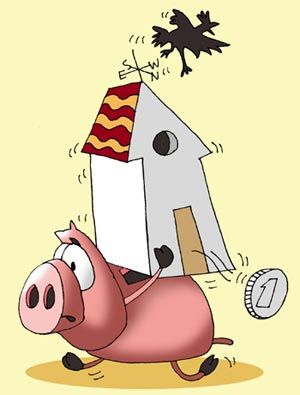In the Budget, the government has banned cash transactions above Rs 300,000. This means that people will have to pay stamp duty and registration charges on the actual cost of transaction.
Property investors never had it this bad. Prices have been stagnant for the past couple of years due to the ongoing slowdown. Demonetisation led to further dwindling of demand. Recent changes announced in the Union Budget are set to hurt investors further.
 From the next financial year, you will only be able to claim a maximum deduction of Rs 200,000 on the interest paid on home loans across all properties owned by you, including what is self-occupied.
From the next financial year, you will only be able to claim a maximum deduction of Rs 200,000 on the interest paid on home loans across all properties owned by you, including what is self-occupied.
Say, a person has a self-occupied house that has an ongoing loan. He can claim up to Rs 150,000 deduction on the principal under Section 80C and up to Rs 200,000 on the interest portion (Section 24).
If this individual buys another house, he could deduct the entire interest on the second loan in addition to the first one, irrespective of the amount.
This has been changed. Now, such individuals will only be able to claim a total deduction of Rs 200,000 on the interest paid for both the houses.
This is a discouraging move for property investors in a market that is already witnessing a slowdown, says Ashutosh Limaye, national director, research, JLL.
Kuldip Kumar, partner and leader-personal tax at PwC India, says this move will increase property prices significantly for an investor and thereby reduce the return when he sells it.
If an investor has income of Rs 24 lakh (Rs 2.4 million) a year and pays interest of Rs 850,000 in the first year for a property that is not self-occupied, his taxable income reduces to Rs 15.5 lakh (Rs 24 lakh minus Rs 8.5 lakh) at present.
From the next financial year, his taxable income will come down to Rs 22 lakh (Rs 24 lakh minus Rs 200,000).
A buyer can, however, carry forward the interest he has not been able to set off for eight assessment years.
In the above example, it will be Rs 650,000 (Rs 850,000 minus Rs 200,000). But, this can only be set off against the rent you get from a house. This means, your rent needs to be higher than the interest paid on the loan.
Real estate experts say banning cash transactions above Rs 300,000 is another issue that could affect returns in the long term. Partial cash payment has always been practised in property transactions.
Cheque payments are done based on the ready reckoner or circle rate of a house. Any amount above that is paid in cash. This enabled the buyer to pay a lower stamp duty and registration cost.
In the Budget, the government has banned cash transactions above Rs 300,000. The person accepting cash will be penalised.
This means that people will have to pay stamp duty and registration charges on the actual cost of transaction.
Black money flowing into property is expected to reduce because of the ban on cash transactions and the Benami Transactions (Prohibition) Amendment Act, further affecting sales and demand, says an official with a real estate services firm.
The Budget has also taken steps to bring premium property owners under the tax net.
If a property owner has let out his house and charges a rent of Rs 50,000 or more a month, the tenant has been made responsible for deducting tax at five per cent and depositing it with the government. This will, in turn, force landlords to show the income in their tax returns.
Illustration: Uttam Ghosh/Rediff.com








 © 2025
© 2025